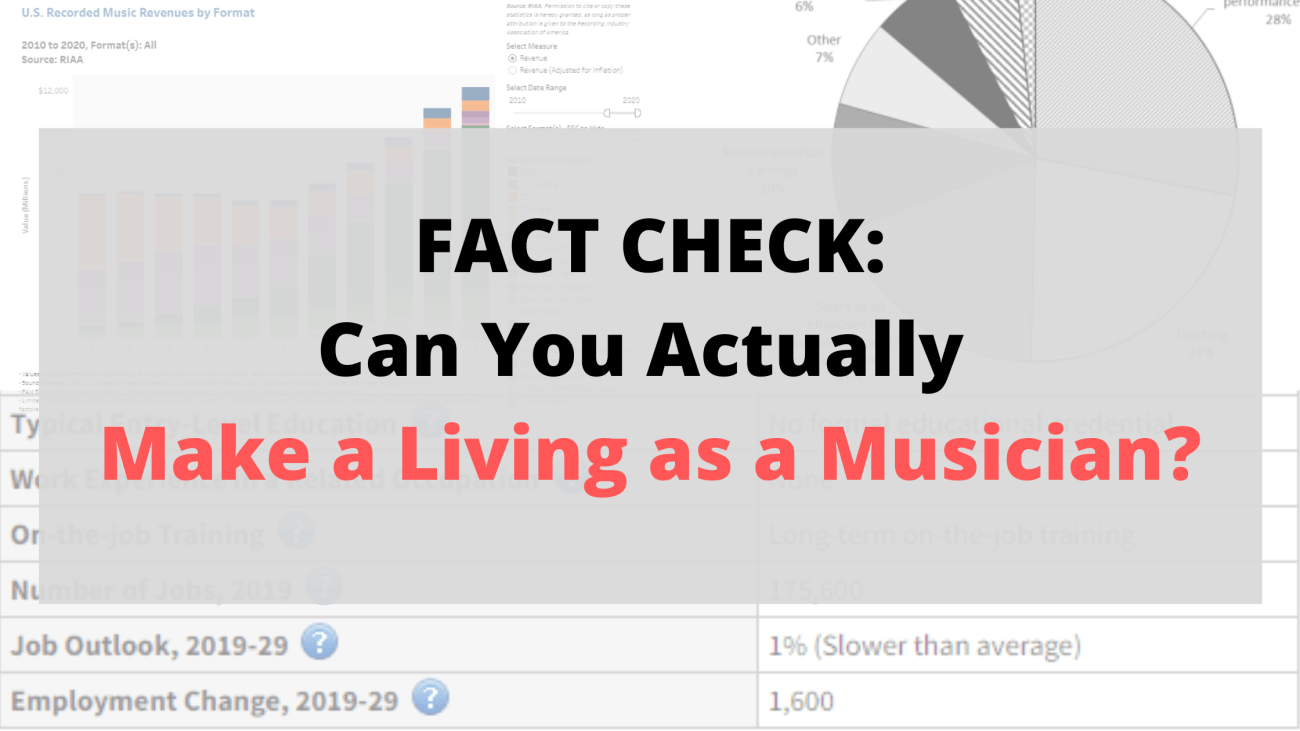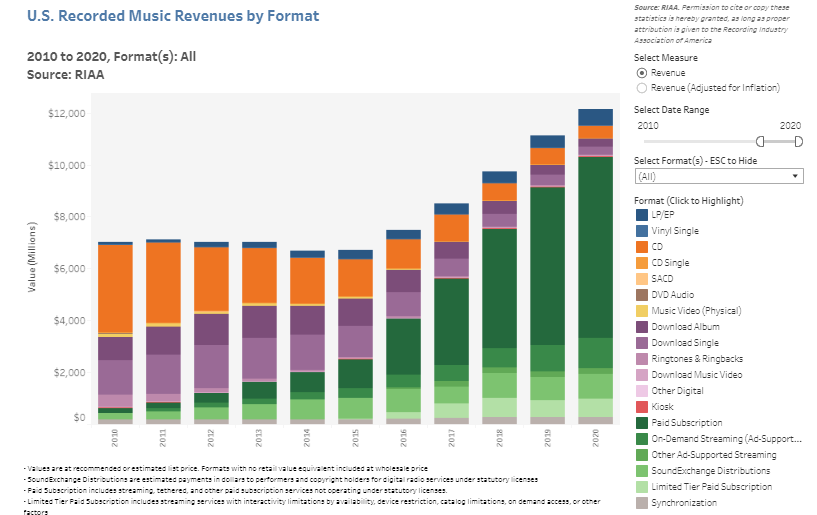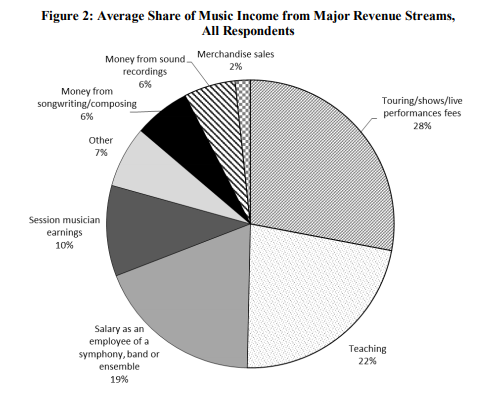
You’ve probably seen this headline so many times before on other blogs.
But this post is different.
I wanted to see if a person today can actually make a living as a musician.
And I’m talking about a salary you can, you know…live on.
So to find the answer, I looked at 3 independent studies, RIAA stats, and numbers from the United States government.
Let’s jump right in…
Five things from the internet. Twice a month in your inbox. All so you can persevere. 1,600+ other musicians get it.
Table of Contents
The Chance “Anomaly”

You know Chance the Rapper. Everyone does.
He’s had major success as a rapper, and he’s somewhat of an icon for indie musicians.
He’s completely independent, meaning he is not and has never been signed to a record label.
“For a long time, I think I missed out on a lot of opportunities, because I was kinda in a rat race where everybody else just had a boost,” he told Katie Couric.
“But it’s becoming more and more recognized that everyone starts out as an unsigned artist…and being signed doesn’t necessarily make you more validated as an artist.”
How did he get to this point? How does he turn down record deals and stay independent?
Well, first, he makes the best music he possibly can. That’s what everything is centered around.
And that should be step one for all of us.
(To help you focus on making great music today, check out this free worksheet I use).
After that, according to his interview with Couric, he makes most of his income from merchandise and concert tickets.
His music isn’t the main income stream. But because of his quality music, he sells $45 hats and $50 hoodies.
And now he’s in total creative control, which is what every indie artist wants.
Apple Music’s Carl Chery said this level of success is not common, calling Chance “an anomaly.” He said the rapper is “special,” insinuating other artists shouldn’t expect this kind of success.
A website called DJ Booth took those comments and ran with them, writing an editorial piece making similar comments.
Well, Chance had some strong words about being patient and staying independent.
Chance responded to DJ Booth on Twitter, calling it “wack,” saying artists don’t need a label or publisher to succeed.
Whether or not you think Chance has been truly independent, there’s one thing he says that I want to highlight for the sake of this post.
“…Have some damn patience,” he Tweeted. “All your favorite artists are locked up in deals and until they get out (and stay out), you [won’t] see the realization of their full potential.”
And while DJ Booth pointed out that access is not enough, Chance clapped back.
“Algorithms don’t determine people’s taste in music and visibility on a platform’s homepage/playlist doesn’t matter as long as an artist’s audience knows where to get their music,” he said.
So what’s the verdict here?
Do the rest of us have the same chance as Chance? If you’re patient and stay the course, can you, too, find this level of recognition and financial success?
Or is he an anomaly?
Better yet, can you even make a living as a musician?
For that, let’s look at the numbers…
Can You Make a Living as a Musician? (According to 3 Sources)
Lots of blogs say, “Oh yeah, you can totally make a living as a musician. Just buy my thing that shows you how to!”
But not me.
I want to look at the stats and ask, “No but for real — are musicians today actually making a full-time income in music?”
For this, I looked at two studies and stats from the U.S. government…
Artist Revenue Streams
Artist Revenue Streams was a project that studied how musicians in the U.S. made money, how income sources were shifting, and why.
They published a bunch of reports between January 2012 and December 2014.
So, to help me answer the question, “Is a full-time career in music worth patiently working toward?”…
I looked at one of ARS’ “mythbusting” studies, which included responses from 5,013 musicians.
“There are some musicians who are doing very well financially, and we applaud their success,” they write.
“But, just like the US population, there are very few at the top. While there are a handful of musicians who are wealthy, the vast majority of working musicians in the US are working or middle class earners.”
In other words, very few artists will find success like Chance the Rapper. So Chery was right when he said Chance was an anomaly.
But Chance was also right in saying that musicians can make a living without a label.
(These conclusions are backed up by the numbers I’ll cover in this post).
Forty percent of survey respondents said they spend 36 or more per week doing music. And 42% said they earned all of their income from music.
That means more than 2,100 musicians in this study are full-time musicians.
And ARS found that the gross estimated music income (EMI) for each respondent was $34,455
That’s a full-time income in many U.S. cities today.
They also found that full-time musicians (those spending at least 36 hours a week doing music and earning 90% or more of personal income from music) had a gross EMI of $62,757.
That’s a full-time income in most U.S. cities today.
Okay, but ARS operated many years ago, conducting their studies in the early-to-mid-2010s.
What about more recent stats?
The United States Bureau of Labor Statistics
As of May 2019, the U.S. Bureau of Labor Statistics pulled data from 175,600 reports from “musicians and singers.”
They found the median hourly wage for “musicians and singers” was $30.39 per hour.
And the typical musician/singer had no formal education.

If we say a musician with this median hourly wage worked just 20 hours a week, they’d make $31,605 a year.
If they worked 36 hours a week at that rate, they’d make $56,890 a year.
The BLS did point out that many musicians in their subset were part-timers.
“Many musicians and singers find only part-time or intermittent work and may have long periods of unemployment between jobs,” they wrote.
“The stress of constantly looking for work leads many to accept permanent full-time jobs in other occupations while working part time as a musician or singer.”
The Creative Independent
In 2019, The Creative Independent conducted a survey on making a career in the music industry.
But they had a sample size of only 298 people. And those people weren’t just musicians, it also included “music industry professionals.”
Their first key finding was that “the vast majority of musicians cannot earn a living wage through music-related work.”
“Cannot” is a strong word. As we see from the other studies, literally thousands of musicians are making a living wage through music-related work.
They found that 12% of the musicians (35-36 of them) said 80-100% of their income came from music-related work.
Their second key finding was that “the music industry is much more accessible to those with financial privilege.”
This one is obviously true.
If you have plenty of money, you can buy better equipment, pay for courses that teach you essential skills, and you may even be able to afford to take time off work to make music.
Overall, TCI’s study carries much less weight than the other studies I looked at because their sample size was much smaller.
How Musicians Are Making Money Today (According to RIAA and a Scientific Study)
The above studies show us that, yes, you can totally make a living as a musician.
It’s difficult but possible.
Thousands of other people are. So you can too.
Okay, so if you can build a full-time career in music, the next questions I had were…
How are these musicians making their money? And how can we do the same?
Here are the main ways musicians are making money, according to RIAA and a scientific study from a respected university…
Recorded music
The first and most obvious income stream is from recorded music.
But how, specifically, are musicians making money from their tracks?
For this, I looked at info from The Recording Industry Association of America (RIAA).
In case you’re not familiar, RIAA members “create, manufacture, or distribute sound recordings representing approximately 85% of all legitimate recorded music consumption in the United States.”
And they have revenue stats going back all the way to 1973.
But for this post, we’ll look at the last 10 years (2010-2020).
Take a look at this graph…

From these stats, I noticed three notable trends over the last decade…
1. Physical EP/album sales and digital download have declined
We all kind of already knew this.
People are buying less music, whether it’s physical or digital.
Just look at the oranges (CD sales) and the purples (digital downloads). They both take a drastic dive.
The exception is the LP/EP category (the blue at the very top), which has slightly increased.
Does this mean more people are downloading EPs? I’m not sure what this means exactly.
But the big-picture trend is that physical and digital sales are down.
2. Streaming has skyrocketed
The correlation between the decline in music sales and the increase in streaming is too hard to ignore.
I think it’s safe to say it’s more than a correlation. It’s a direct cause-and-effect.
Look at the greens (the varying types of streaming sources). They skyrocket, making up several billion dollars of revenue.
This may be old news, but streaming is very much in.
And Spotify is the largest contributor to streaming royality payouts.
Even though Spotify doesn’t pay that well per stream, artists are making money (even a full-time living) from the platform.
According to their Loud and Clear site, in 2020:
- 184,500 artists made over $1,000
- 67,200 artists made over $5,000
- 42,100 artists made over $10,000
- 13,400 artists made over $50,000
- 7,800 artists made over $100,000
- 1,820 artists made over $500,000
- 870 artists made over $1,000,000
I also want to point out, a significant portion of the streaming-related payouts in RIAA’s stats are from SoundExchange, which is the sole organization in the U.S. that collects digital performance royalties.
These are royalties earned from non-interactive digital streams, which would be payments from platforms like SiriusXM, Beats 1, and Pandora.
So first, you should get your music on these platforms (via a digital distributor).
Second, you should sign up with SoundExchange.
3. Sync licensing has stayed relatively constant
I also noticed that the revenue for sync licensing has stayed constant at just over 2% of all of the revenue streams.
Yes, 2% is not very significant, but not only has it stayed fairly steady, it was also a $265 million industry in 2020. Probably more, as this number is only according to RIAA.
Now, I wouldn’t be surprised if sync licensing revenue collectively declines in the coming years.
More and more licensing companies are offering subscriptions to their clients and paying their artists a few bucks or even pennies per license.
But there are currently decent payouts in sync licensing, depending on who you work with.
So if you’re not already, I’d suggest you submit your music to a sync company that pays well.
In my experience, Crucial Music and Tracks & Fields seem to have fair payouts.
Get yourself a slice of that $265 million.
4. Producers are behind it all
Streaming has skyrocketed. Brands want high-quality tracks to license.
Who’s making this music?
Producers like you and me are.
Now, most of these tracks are probably produced by the artists releasing the music. But not always.
In fact, many people make part of their income by producing music for others. Just look at a platform like SoundBetter.
So here’s my suggestion…
Focus on improving your production skills.
It will help you get more streams. It will make your tracks more desirable for sync. And you can make money by producing other artists.
Performing
In a 2013 study by Northwestern University School of Law involving more than 5,000 survey respondents, we see that most musicians make money from performing.
I will note that the author of this study said we should take the below graph “with a grain of salt and not over-generalize about how musicians earn revenue.”
For example, he said that, even though such a small percentage of musicians made money from merchandise, those who did, made an average of 14% of their total income from merch.
Quite a chunk, if you ask me.
The point being, this graph doesn’t seal anyone’s fate. It’s not saying you can only make money THIS way and not THAT way.
But it is helpful to examine…

With 2020 being what it was, performers have had to adapt. More people are live-streaming, and you can do very well financially.
Performing live as we knew it will return eventually, but I believe live-streaming will stay a strong method for supplemental performance income.
So, even if you’re someone like me who loves to stay in their studio, writing and recording songs, it will benefit you to at least do live-streaming.
Twitch. Instagram. YouTube. Facebook.
All of these platforms let you stream live. Try them. Ask fans for donations. Drive people to your Spotify.
The point is, performing is and will always be a key element of sharing the joy of music. Whether you do that in-person or online, it needs to be part of your music career plan.
Teaching and session musician work
The next top categories of income according to this study (that are worth mentioning) are teaching and working as a session musician.
I’m talking about these income streams together because if you can do one, you can do the other.
If you’re a good enough musician that people hire you to play on their tracks (in-person or remotely), you surely have the knowledge and skills to teach wannabe musicians.
And if you already teach people how to play an instrument, you’re probably good enough to earn money playing that instrument on an artist’s song.
So how do you get into these avenues of work?
Here are some quick tips…
For teaching music:
- Music stores often hire musicians to give lessons to their customers, so check with your local music shops
- Teach online through a company like Musika or TakeLessons
- Post on social media, hang flyers around town, and use Word-of-Mouth
For session musician work:
- Make sure you have the ability to record at home for remote work
- Contact and network with engineers at local recording studios (or ones that have helped create music you like - remember, you can work remotely)
- Record some portfolio items (just you on your instrument or a fully produced track)
- Promote your services on social media
“Other”?
The study doesn’t explain what the “Other” category means. It doesn’t say what the survey respondents classified as that income stream.
This might seem frustrating, but I see it as liberating.
“Other” could mean literally anything music-related, and a big chunk of musicians are making music this way.
For example, my career is 100% centered around music — writing music advice content being my main source of income right now.
But for you, this could be…
- YouTube ad revenue
- Working behind the counter at a music shop
- Doing music journalism
- Helping other artists as a music marketer
- Getting fan donations
- And so many other methods…
The point is, you can forge your own path in this regard.
Whatever music-related skills you have, use them to build a career in music.
Diversify your income streams.
Define what “Other” income means to you.
Seven percent of musicians are, so why not you?
Is It Worth Patiently Building a Career in Music?
In order to honestly answer this question, let’s recap what these stats, studies, and graphs tell us.
These are my takeaways:
- You most certainly can make a middle-class salary as a full-time musician (thousands of others are doing it)
- You may be a part-time musician for a while, which will take patience, consistency, and focus
- Even as a part-time musician, you can make a decent side income
- You probably won’t find Chance-the-Rapper-level fame (neither will most musicians)
- The revenue streams that make the most sense for most musicians today are:
- Streaming royalties
- Sync licensing (for now)
- Performing (in-person or live-stream)
- Teaching music
- Session musician work (in-person or remotely)
- Freelance music production
- Miscellaneous/”Other” income streams (which can include any creative ways you can make money from your music-related skills)
So, yes, it is totally worth putting in the time, effort, patience, and consistency to build your music career the way you want.
But really, the most important reason you should try to make a living as a musician…
Is for the deep reward of making music that matters. Music that connects you with other humans.
I already mentioned how the study from TCI doesn’t carry as much weight as the other studies…
However, one of their key findings is worth mentioning.
“…Personal connections and a supportive social circle are critical in sustaining a career as a musician.”
This, I whole-heartedly agree with.
Music is a communal thing.
We play music together and we learn from each other.
So patiently and consistently build your career. Just don’t forget to enjoy the ride with your friends.
Five things from the internet. Twice a month in your inbox. All so you can persevere. 1,600+ other musicians get it.
A few notes…
- If you want to create a plan that gives you focus and helps you stay consistent, check out this digital workbook called Create Your Game Plan
- To see a big list of potential income streams, check out ARS’ resource here
- For more details on other similar studies from ARS, check out their Survey Data Portal
- I didn’t talk about how to make a living as a musician in a symphony/ensemble because I don’t believe it applies to most people reading this post
- I will be updating this post if/when new studies on this topic are published
Further reading
- Casino Not On Gamstop
- Non Gamstop Betting Sites
- Non Gamstop Casinos UK
- Casino Retrait Immédiat
- Casino Sites Not On Gamstop
- Gambling Sites Not On Gamstop
- Non Gamstop Casinos UK
- Non Gamstop Casino Sites UK
- Slots Not On Gamstop
- Non Gamstop Casino UK
- Meilleur Casino En Ligne
- Beste Online Casino Nederland
- Non Gamstop Casino UK
- Casino Sites Not On Gamstop
- Non Gamstop Casinos
- UK Casinos Not On Gamstop
- Sports Betting Sites UK
- Slot Sites Uk
- Gokken Zonder Cruks
- Non Gamstop Casinos
- Non Gamstop Casinos UK
- UK Casino Sites Not On Gamstop
- UK Online Casinos Not On Gamstop
- Migliori Casino Non Aams
- Migliori App Casino Online
- Migliori Casino Non Aams
- Top 10 Casino En Ligne Belgique
- I Migliori Casino Non Aams
- Meilleur Site Pour Jouer Au Poker
- Paris Sportifs Crypto
- KYC 인증 없는 카지노
- Casino Live En Ligne Français
- 온라인홀덤
- Top Casino En Ligne
- Casino En Ligne
- Casino Italia Non Aams
- Casino En Ligne Français
- Migliori Siti Casino Non Aams 2026
- 카지노코인